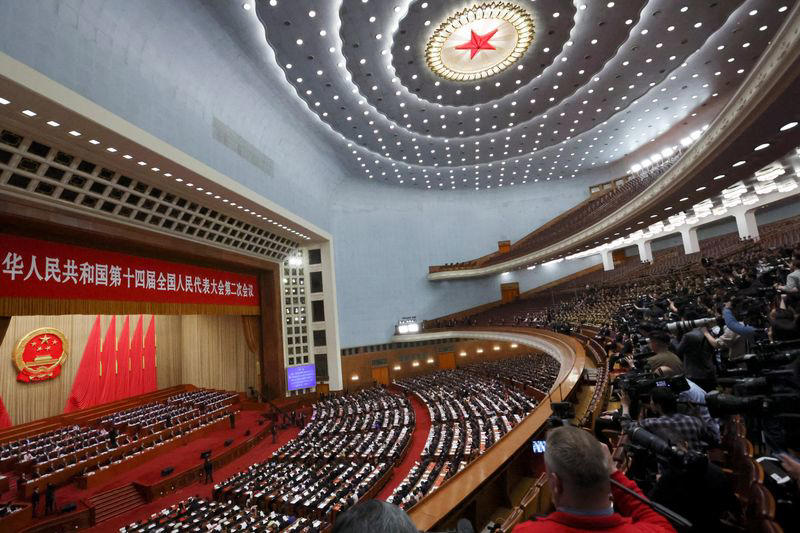Explainer-What is China's planned financial stability law and how will it work?

FILE PHOTO: Chinese officials and delegates attend the closing session of the National People's Congress (NPC) at the Great Hall of the People in Beijing, China March 11, 2024. REUTERS/Florence Lo/File Photo
BEIJING (Reuters) - China is moving closer to unveiling its financial stability law, which includes setting up a fund to rescue troubled financial institutions, as part of Beijing's broader efforts to prevent systemic financial risks in the world's second-biggest economy.
A revised draft of the bill underwent a second review by the nation's top legislative body, the National People's Congress (NPC) Standing Committee last week. China's legislative body usually passes a bill after a third review.
Here is what we know about the new law and the financial stability guarantee fund:
WHAT IS THE FINANCIAL STABILITY LAW?
The bill is China's first comprehensive piece of legislation specifically focused on the prevention, resolution, and disposal of risk in the country's $66 trillion financial sector, which includes banks, insurers, asset managers and securities firms.
China has previously enacted industry-specific bills for commercial banks, securities and insurance, but this new law fills a crucial gap in the regulatory framework, according to a note by Chinese law firm JunHe.
The law provides "a top-level design for systemic financial risk prevention and cross-agencies supervision", addressing the need for better coordination among different financial regulators and market participants to prevent systemic financial risks, analysts at Huatai Securities said in a report on Monday.
The bill underwent the first review in December 2022. New revisions released on Monday said a central financial work leading body would be responsible for decision-making and supervision of financial stability and development policies.
Financial regulators and local governments should also fulfill the responsibilities of preventing and defusing financial risks, according to the revisions.
WHAT IS THE FINANCIAL STABILITY FUND AND HOW IS IT FUNDED?
A key priority of the law is the establishment of a financial stability guarantee fund. The fund is designed as a backup funding source to rescue troubled financial institutions to prevent contagion risks. The fund would primarily raise money from financial institutions, according to the bill.
China's central bank can also provide cheap loans through the relending facility, it said, adding the loans should be repaid by income from the disposal of risky institutions.
The exact size of the fund has not been officially disclosed. However, in 2022, China's banking regulator said the fund had initially raised 64.6 billion yuan ($8.89 billion) from financial institutions.
Eventually the fund is expected to raise 120 billion yuan to 180 billion yuan each year, analysts at China Securities said, which would make it big enough to deal with any major financial crisis.
The fund would cover systemically important financial firms that are "too big to fail", such as major banks and insurers, as well as institutions that are identified as having high risks, the analysts said.
To mitigate moral hazard, the bill stipulates that troubled financial firms and their major shareholders are required to rescue themselves first and to take all necessary steps to clean up debt and recover losses before seeking external help.
WHY DOES CHINA NEED THE FUND NOW?
The setting up of the fund aligns China with international practices. Major developed economies including the U.S. and the European Union have similar funds to provide capital support to troubled systemically important institutions.
China has already set up deposit insurance, an insurance guarantee fund and a trust guarantee fund, but scale of these funds is not enough to deal with systemic financial risks.
The rescue of troubled small regional lender Baoshang Bank in 2019 used more than half of the deposit insurance fund, which had a balance of 121.6 billion yuan as of the end of 2019.
China's financial system currently faces multiple challenges stemming from an ongoing property crisis and a sluggish economic recovery. Small and medium-sized banks have emerged as a vulnerable part of the financial industry.
China's financial stability is also threatened by the $9 trillion debt amassed by local government financing vehicles (LGFVs), platforms created to fund local government projects.
This debt burden poses potential contagion risks, as a wide range of financial institutions including regional banks and trust companies have high exposure to LGFVs.
($1 = 7.2666 Chinese yuan renminbi)
(Reporting by Ziyi Tang and Ryan Woo; Editing by Sumeet Chatterjee and Jamie Freed)
